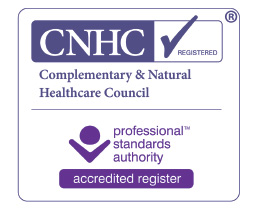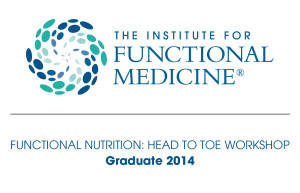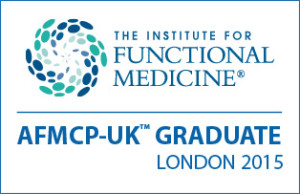This page answers questions you may have about my London functional medicine clinic in Marylebone. I will first describe what functional medicine is, how it relates to naturopathy and nutritional therapy and why we need functional medicine in the modern world.
You can also find out about my London functional medicine clinic services, including what to expect in clinic, how it works and the tools I use to support you towards optimal health according to functional medicine principles.
Finally you can find a list of my London clinic prices, how to contact me and the location of my London clinic,
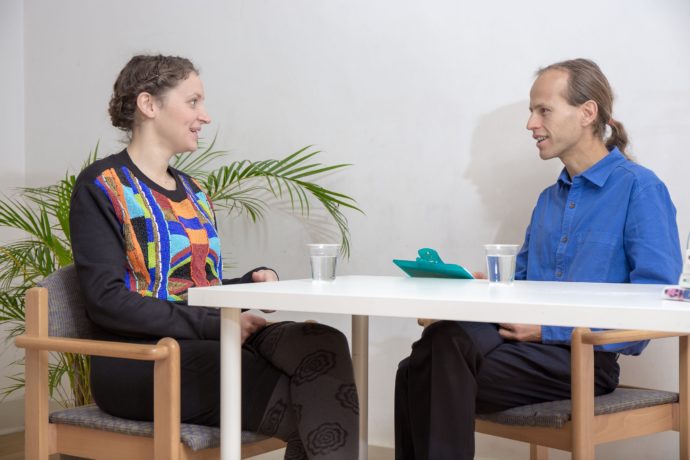
What is functional medicine? (5 principles)
There are many principles of functional medicine, but these are the top 5 in my list that I would say most inform good functional medicine clinical practice.
1. Functional medicine investigates the root cause of disease
A central principle of both functional medicine and naturopathy is to find the root causes (or sometimes just one root cause) of disease and to work primarily at that level.
When symptoms are merely suppressed and the underlying disease process is not addressed symptoms are likely to appear at a later date, possibly returning with a vengeance and then being harder to deal with or manifesting as a completely different set of symptoms.
So according to functional medicine, mere symptomatic relief can be a case of ‘kicking the can down the road’.
That’s all very well as an interesting hypothesis, but you will be wanting a concrete example to really drive this home.
How painkillers can make headaches worse – the consequences of simply alleviating symptoms
If you have a headache you may take a painkiller. You want to numb the pain and that is completely understandable.
But what is causing your headache?
And what if your painkiller is actually making your disease process worse in the long run and even increasing your risk of more serious disease?

A headache could have many causes, but let’s say it was due to poor gut health and in particular a ‘leaky gut’.
In simple terms a ‘leaky gut’ (or intestinal barrier dysfunction) is when your gut wall is too porous and allows undigested food particles into your bloodstream as well as toxins from gut bacteria. These food particles and in particular bacterial toxins known as endotoxins or lipopolysaccharides are key drivers of inflammation which in turn could be causing your headache (1).
The most common class of painkillers used are non-steroidal anti-inflammatory drugs (NSAIDs), which are known to cause ‘leaky gut’. So if you take NSAIDS for your occasional headache perhaps they could exacerbate your leaky gut so that your headaches become more frequent, so you would take the NSAIDS more frequently and you could end up with a chronic headache disorder. This vicious circle would lead to what is known in the medical research as a medication overuse headache (2).
A 2024 study found that in migraine sufferers medication overuse headache is indeed associated with increased levels of inflammatory endotoxins in the blood, suggesting that a ‘leaky gut’ caused by NSAIDs may indeed be causing inflammation and medication overuse headache (3).
Evidence suggests that elevated levels of endotoxins in the bloodstream due to a leaky gut may play a role in the development of many conditions, including cardiovascular disease (4), type 2 diabetes (5), Alzheimer’s disease (6), Parkinson’s disease (7) and CFS/ME (8).
2. First do no harm
The original occasional headaches in the example above could have been caused by many other factors, but overuse of painkillers may then have then caused more serious health consequences.
This kind of ‘medicine’ transgresses the Hippocratic Oath “First do no harm”, which is another key principle of both naturopathy and functional medicine, and is still sworn by medical students to this day.
Hippocrates, the “Father of Medicine”, might have thought about this in the following hierarchy of benefit to risk:
Hippocrates’s hierarchy?
- food as medicine – the least harmful medicine
- herbal medicine (if food as medicine is not enough) – could potentially carry some risks as many herbs have some degree of toxicity and potentials side effects, contraindications and cautions around their use
- surgery (when food and herbs fail)- extremely risky in the 4th or 5th century BC
A benefit to risk hierarchy for a functional medicine practitioner might be as follows:
Functional medicine hierarchy?
- food as medicine, physical and mental exercise as medicine, spiritual practice and ‘energy work’ such as meditation, shiatsu, yoga, acupuncture and T’ai Chi Ch’uan
- nutritional supplements – active in the body as food is, but dosing and ‘non-food excipients’ carries some potential risk
- herbal medicine and supplements
- medical treatment such as medication and surgery – sometimes essential and miraculous when other approaches will fail – Please note I do not provide medical treatment. I am a functional medicine practitioner and not a functional medicine doctor.
3. The uniqueness of the individual
After investigating the root cause or causes of a disease process it would be irresponsible not to tailor recommendations to the individual according to those root causes that have been discovered.
This functional medicine principle is in stark contrast to the medical model in which medical practitioners adhere to algorithms that are centrally decided, such as the NICE guidelines in the UK.
For example, rather than taking the time to investigate the many potential causes of a patient’s poor thyroid function, a GP will simply prescribe thyroid hormone replacement.
4. The systems and organs of the body are all interconnected in a complex web
This principle of functional medicine is the reason I do not specialise.
If you are suffering from fatigue or from a headache it could have many potential causes. Gut dysbiosis, hormonal imbalances, micronutrient deficiencies, blood sugar dysregulation, viral infections, food sensitivities or a toxic burden are some of the potential factors that could be at play, and some or even all of these factors could be interacting.
To be able to support clients with fatigue, therefore, I maintain a breadth and depth of knowledge, and my working life involves hours of research and study on a daily basis.
5. The power of food to heal – Hippocrates as nutritionist?
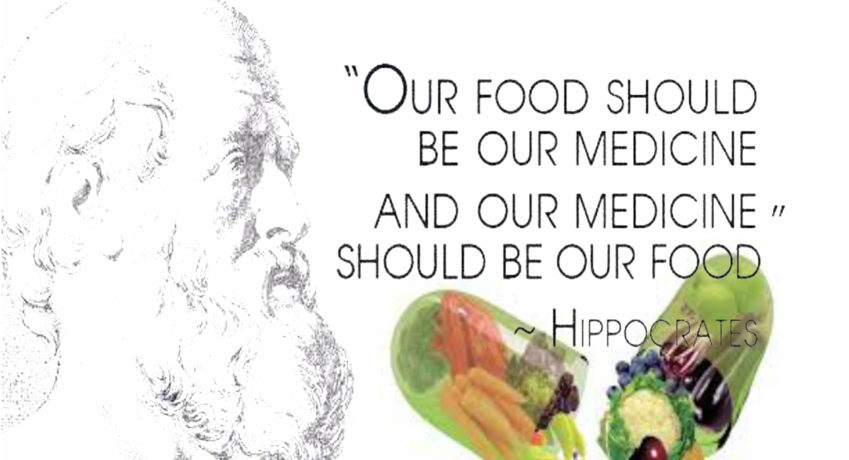
I will leave it to classical scholars to reach a consensus on whether or not the phrase “Let food by thy medicine” originated with Hippocrates, but certainly he was a proponent of food as medicine in the wider sense of the word ‘medicine’ (9).
The power of diet to influence health and disease is an important principle of functional medicine, naturopathy and, as the name implies, nutritional therapy.
Food is a first line therapy both because the potential for harm is less than with many other approaches and in recognition of the power of functional foods, whose health benefits go beyond their basic nutritive value. One of the most health-promoting components of foods are molecules in plant foods known as phytochemicals, which in fact have no nutritive value whatsoever.
I am not intending to use Hippocrates’ words as any kind of evidence for the power of food as medicine and for the key role that nutritionists can play in healthcare, but if you read my blog you will find numerous examples of the potential of food and lifestyle to both heal and to cause disease, with plenty of reference to the research literature to support my claims.
The roots of functional medicine and naturopathy
Since functional medicine and naturopathy seek to find the root causes of disease it seems worthwhile to follow the trail as best as we can to the roots of functional medicine itself.
Functional medicine builds upon traditional food medicine by incorporating modern scientific discovery. It arose from the meeting of naturopathy with systems biology and molecular medicine, and presents a set of principles by which to practise (10).
I would argue that most of the principles of functional medicine are exactly the same as the principles of naturopathy, albeit reworded, and so I consider functional medicine to have arisen largely from naturopathy.
The roots of naturopathy, in turn, may originate from much further afield in space and time than you might think, in an ancient philosophical tradition that can serve as a guide for effective, safe and ethical clinical practice.
Functional medicine is known for its emphasis on scientific rigour, but most modern naturopaths and nutritionists also focus on evidence-based medicine.

Functional medicine doctor vs functional medicine practitioner
A functional medicine doctor prescribes medications
Functional medicine doctors usually begin their careers as a medical practitioners; as GPs if based in the UK or MDs if in the USA. As GPs or MDs they are trained in the use of medications and medical procedures, including some lab testing, but have very limited training in nutrition and lifestyle medicine if at all.
Later in their careers they may hear about functional medicine or something else prods them in this direction, and they may do some extracurricular training in dietary and lifestyle interventions and the functional medicine approach. They may then incorporate some of this knowledge into their medical practice.
Very few functional medicine doctors complete a post-graduate diploma in nutritional therapy or an MSc in nutrition to provide them with the breadth and depth of knowledge and understanding of nutritional and lifestyle medicine that is required for membership of a nutritional therapy or naturopathy professional body or to work as a nutritionist.
Functional medicine practitioners who are not doctors are fully trained in nutrition & lifestyle medicine
The work of most functional medicine practitioners who are not also functional medicine doctors is born from a conviction in the inherent power of healing with nutrition and lifestyle interventions. This is the area they train in, work in, and will usually focus most of their professional attention onto.
They will usually have completed in-depth training in nutrition and lifestyle sufficient to qualify for membership and be members of both a functional medicine professional body and a nutritional therapy or naturopathy professional body. The initial training may take the form of a post-graduate diploma or an MSc, though professional bodies require ongoing training and most practitioners will far exceed these requirements.
I fall into this camp; I do not offer medical treatment at the London functional medicine clinic nor at any other location. Instead I combine the skills of a nutritionist with in-depth knowledge of lifestyle medicine.
The importance of functional medicine in the modern world

Toxins we have not evolved protection from
The human body evolved to make use of nutrients and to protect itself from toxins found in the natural environment. It has not evolved to cope so well with molecules in food, water, air and medicine that did not exist before man created them or that were not found at the same levels that they are today, especially in a busy metropolis like London (11, 12, 13, 14).
A new molecule is in fact made all the more profitable by the fact that it did not already exist and is thus patentable. This puts maximising profit without limit in direct conflict with human health and wellbeing.
As it happens nutrients are vital for detoxification, and a toxic burden can deplete nutrients, so the double whammy of artificial types and levels of toxins and poor quality nutrition can result in a self-perpetuating cycle.
Public health initiatives since World War 2
For most of this century we have been on a health programme that began in the middle of the 20th century with food fortification and the low-fat diet, and decades later was followed by recommendations for salt reduction and the 5 A Day campaign.
In 2007 smoking was banned from all enclosed public places in the UK.
Then the sugar reduction programme began in 2016.
During this period we have also had the introduction of closer monitoring of our health which has resulted in an increase in preventative medication.
For example, the cholesterol threshold for being prescribed statins plummeted from 1983 to 1990 (15) and has come down a little more since then, so that statins have been increasingly prescribed.
Normalising the epidemic of chronic disease
Despite all of these public health campaigns we now find ourselves in the midst of an epidemic of chronic disease.
One could argue that the huge spike in autism, for example, could be down to improved diagnosis and that the success of the pharmaceutical approach against infectious disease has led to an ageing population more prone to developing Alzheimer’s disease and cardiovascular disease.
Here I will give you just two examples where these arguments cannot fully explain the rising incidence of chronic disease.
Allergy – a new disease

Allergies were unheard of until the early 19th century and have been linked to urbanisation. It is likely that excessive hygiene as well as increasing exposure to pollutants are two of the key drivers behind the immune system dysregulation resulting in allergies, allergic asthma and eczema (16).
By ‘excessive hygiene’ is meant the increasing success against infectious disease, exposure to which can prime the immune system against allergy (assuming you survive the infection).
The number of people in the UK affected by asthma is amongst the highest in the world with a prevalence of around 15%, though it depends on the source of the data and how asthma is defined (17). London has one of the worst asthma rates in the UK, which is usually attributed to the air pollution.
Atopic dermatitis (the most common form of eczema) has doubled or tripled in recent decades in industrialised nations.
Autoimmune disease is also a disease (or set of diseases) of immune dysregulation for which infections earlier in life may be protective, and has also seen a rise in prevalence that is too high to be explained by improved diagnosis (18).
Type 2 diabetes, cardiovascular disease and Alzheimer’s disease
Adult-onset diabetes has been renamed type 2 diabetes as the prevalence in children continues to increase along with rising rates of obesity, which of course means that the rise in type 2 diabetes cannot be entirely due to an ageing population. Moreover type 2 diabetes is entirely preventable with dietary and lifestyle interventions (19).
As adults, type 2 diabetes doubles (in men) or triples (in women) the risk of cardiovascular disease (20) and increases the risk of both Alzheimer’s disease and vascular dementia (21).
In fact the scientific literature has often referred to Alzheimer’s disease as type 3 diabetes, given the central role that glucose management and insulin resistance may play in its development (22).
Insulin resistance and chronic disease
You don’t even need to be diabetic for elevations in blood glucose to increase your risk of heart disease.
Insulin is the hormone that signals to your cells to take up glucose from the bloodstream.
When insulin at normal levels fails to lower blood glucose we have insulin resistance. This causes the pancreas to secrete ever increasing levels of insulin and drives the process that eventually leads to type 2 diabetes.
Elevated blood glucose after meals is an early sign of insulin resistance, but even this early stage is linked with an increased risk of heart disease (23). Moreover even young lean adults can have elevated glucose after meals, especially in some Asian ethnic groups (24).
Insulin resistance has also been linked with many other conditions prevalent in the UK, such as PCOS (polycystic ovarian syndrome), high blood pressure, obesity (25), depression (26), Alzheimer’s disease (27), poor gut health (28), migraine (29) and osteoarthritis (30).
We in the industrialised world have come to accept acne as a normal and expected part of adolescence, but acne is far from inevitable and insulin resistance is known to be a key driver of acne (31).
Mismatch between our genetics and environment, diet and lifestyle
Although pharmaceutical medicine has had great success with acute infectious disease, our industrial success has clearly exerted a huge toll on human health and the current health paradigm has arguably aided and abetted our collective decline to some degree. There is now a glaring mismatch between our genetics and our rapidly changing environment, diet and lifestyle.
Functional medicine for optimal health – we could do much better!

Using the latest advances in our understanding of the impact of nutrition and lifestyle choices on health, functional medicine offers a way forward to thrive physically and mentally, whether your goal is to reverse or reduce the impact of chronic disease, improve your cognitive function so you can enjoy good mental focus, relieve pain and discomfort, increase your healthspan or simply to increase your vitality and wellbeing so that you can enjoy life more fully.
Observational studies suggest beneficial outcomes of functional medicine for a wide range of chronic conditions and for overall quality of life (32, 33).
Nutritional therapy with naturopathy and functional medicine
In my London functional medicine clinic practice I am also guided by my training in naturopathy and nutritional therapy. As a nutritional therapist I combine the knowledge and skills of a nutritionist with the lifestyle medicine and guiding principles advocated by functional medicine and naturopathy.
There are some differences between functional medicine, naturopathy and nutritional therapy, but their principles are all in alignment.
My training & experience at the London functional medicine clinic
I have been working as a functional medicine practitioner full-time since I opened my clinic in 2014. I spent most of that time in clinical practice but for 5 years I also worked 1 or sometimes 2 days a week in research and development for a functional blood testing laboratory.
Training I have completed in functional medicine, nutritional therapy and naturopathy forms the vast majority of my accredited CPD, with some additional training in research methods and critical appraisal at the Royal Society of Medicine. I spend additional hours every working day immersed in research and study.
You can find out more about me, what led me to do this work, my professional accreditation and working experience both in clinic and in research.
Another way to get a perspective on my approach to nutrition, lifestyle and health is to read my blog, perhaps beginning with my introductory post on inflammation.
London functional medicine clinic services – what to expect
So how do I apply the principles of functional medicine in clinic? How do I investigate the root causes of disease and give appropriate dietary and lifestyle advice for you as a unique individual?
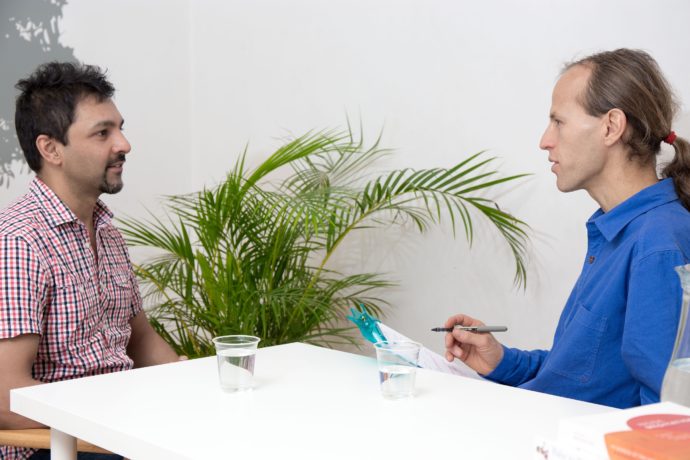
Personalised medicine at the London functional medicine clinic
I have already discussed how in functional medicine we consider each individual to be unique and thus to require a personalised approach. Biochemistry, personality, genetics, life experiences, career, family commitments are just some of the areas that need to be taken in to account and there is a danger in making generalised statements about health and nutrition that may not apply to you as an individual.
That is why I follow the functional medicine approach in asking detailed questions about your symptoms, medical history, family medical history, dietary and lifestyle habits, known toxic exposures, sleep patterns, stress levels and more, as well as assess functional lab tests and genetic tests as and when appropriate, all in order to make sure that the advice given is appropriate to your individual needs to the best of current scientific knowledge and also based on years of clinical experience.
Personalised assessment
I gather this information about you
- in a detailed questionnaire I ask you to complete before your initial consultation
- in a four day diet diary I ask you to fill in before the initial and all subsequent consultations
- in the conversation I have with you during each consultation
- from functional lab testing
- from genetic testing
Personalised explanations
I then seek to help you understand your health in a simple way (or in a more complex way if that is your interest), since this can be empowering for you in your own health journey and can increase your confidence and motivation. The explanation I give to you will not be the same as for another individual with the same set of symptoms as you or with the same medical diagnosis as you, unless the causes of and driving factors of your disease processes are very similar.
I personalise these explanations in another way; if you get easily overwhelmed by details I will bear that in mind but if you are hungry for more detailed explanations I will be very happy to answer any questions you have during your consultation.
Personalised recommendations

I outline my recommendations during the consultation so that we can discuss any challenges you may have in implementing the recommendations. I do ask that you communicate any challenges you can foresee due to your personal life circumstances, preferences, religious or ethical beliefs, financial and time limitations and personal capacity to make changes in your life, so that together we can find the best approach for you.
Recommendations generally fall into 4 main areas:
- dietary recommendations
- lifestyle recommendations
- lab testing
- supplements
It can take much of the initial consultation to build up an in-depth picture of the factors that could be driving your disease process, but I always aim to give you some initial recommendations in at least one of these 4 main areas.
Functional lab tests
Lab tests are recommended according to your individual needs, being selected from a wide range of tests focusing on gut health, hormones, cardiovascular health, micronutrient testing, antioxidants and oxidative stress and much more. Samples you provide could include blood, saliva, urine, hair and breath.
I am often asked about DUTCH, Organic Acids, NutrEval, GI Effects and GI360 stool testing, all of which I offer.
The only test for both vitamins and minerals currently available in the UK that I recommend is the Spectracell Micronutrient Test, which also includes testing for antioxidants such as glutathione.

Test kits are usually sent to your home and can usually be done at home, except for blood tests which would depend on a mobile phlebotomist being available in your area.
I explain your lab test results during a consultation.
In my interpretation I relate your test results to your symptoms, previous test results and any other relevant information, so that we build a fuller picture of what are the key causes or drivers of your symptoms and how best to support you in optimising your health.
The interpretation fee is included in the price of the test.
I charge an hourly rate for interpretation of the results of any lab tests that you have ordered independently or with previous practitioners. (This is the time it takes me to interpret your results before your consultation).
Written report
These recommendations are then sent to you in a written report usually within a few days and always within a week of your consultation, barring exceptional circumstances.
Your report includes a commentary section, in which I reflect some of what you have told me, record your progress, outline potential mechanisms at play as we discover them, and give my interpretation of any test results.
You do not need to take any notes, but if you ask me for more detailed and lengthy explanations that are not likely to go into your report then you may want to make a few notes of your own.
Frequency of London functional medicine clinic consultations

I would typically meet with you every 6-8 weeks, which gives time for completing any tests and receiving the results, implementing dietary and lifestyle changes so that they become habitual before moving onto further recommendation. This time period is also helpful to assess the impact of the changes you have made.
You may want to have consultations more frequently if you feel you need more regular support. This can help to motivate you if your goal is to lose weight or if you are working with addiction or struggling to implement my dietary and lifestyle recommendations.
Please bear in mind that I am often booked up 6-8 weeks in advance and cannot guarantee to have an available appointment for a follow-up consultation within 6-8 weeks of booking. It is therefore your responsibility to arrange follow-up appointments in good time. If you require more frequent support than at 6-8 week intervals you are advised to book more than one appointment at a time.
The consultation is when you can update me on your progress and ask me questions and it is when I will give my recommendations. Your consultation report also serves as a record of the advice I have given.
Support in between consultations – coaching calls and support calls
If you need further support as you are meeting unforeseen challenges in implementing my recommendations, you can book a support call or a coaching call.
A support call can be helpful to fine-tune practical details to help you follow the recommendations successfully, rather than to give completely new advice. I include some time to read through your most recent consultation report before your support phone call but since I am not giving completely new advice I do not update my notes after these phone calls. This allows the time allocated to a phone call to be sufficiently short that I can usually book you in at short notice, usually within a few days or a week.
A coaching call is focused on the emotional or psychological challenges you may meet in implementing dietary and lifestyle changes into your daily life. It can also be booked at short notice.
Nutrigenetics consultations at the London functional medicine clinic

Nutrigenetics consultations are another way to personalise medicine.
I present my interpretation of some of your key genetic variants in a written report that I explain to you in a 2 hour consultation. This includes some guidelines on how your genetic variants affect the best dietary and lifestyle choices you can make to optimise your long-term health.
Although personalised medicine and the use of genetic profiling carried out in this way is sometimes referred to as precision medicine, please be aware that knowing your genetic profile does not lead to a prescription of supplements in precise dosages and precise dietary and lifestyle interventions.
Working with you to find out more about your current health status and how your genetic profile may currently be manifesting and learning about your current dietary and lifestyle habits and the challenges you are meeting in your life can help guide me towards recommendations appropriate to your current circumstances.
A nutrigenetics consultation is therefore best carried out after having at least one nutrition & lifestyle based consultation with me, so that I can relate your genetic variants to what I know about you. You may, however, chose to book a standalone nutrigenetics consultation with me, in which case I will ask you for your main areas of interest so that I can select the most relevant genes to focus on.
For example if there is a tendency to heart disease in your family line and you are keen to avoid any cardiovascular complications, I could focus on any genes that may have an impact on heart health.
You will need to order your own genetic testing.
Who I do not work with and services I do not offer
I do not work with
- cancer
- anorexia nervosa, bulimia or any other eating disorders
- chronic kidney disease
- optimising physical performance for elite athletes
- people who are unwilling to implement dietary & lifestyle changes
- people who are working with other practitioners who also recommend dietary changes, supplements or herbs
I do not offer
- meal plans
- e-mail support in between consultations with a few exceptions – see my e-mail policy and guidelines
- emergency support
Please note: I am a functional medicine practitioner but I am not a functional medicine doctor. Therefore I do not offer medical advice nor emergency care. Nor is my work a substitute for medical care.
London functional medicine clinic prices
Initial consultation (80 minutes): £300
Follow-up consultation (80 minutes): £300
Nutrigenetics consultation (2 hours): £500
You will need to order your own genetic testing.
Lab test interpretation (for tests independently ordered): £65 per hour
Telephone support in between consultations:
- £80 for 45 minutes
- £60 for 30 minutes
- £40 for 15 minutes
30 minute coaching phone calls: £40
Initial 20 minute discovery call: free of charge
London functional medicine clinic packages
- expire within 12 months of booking
- may include your initial consultation or may consist of follow-ups only
- packages are limited and subject to availability
Functional medicine package: £1,350
- 5 functional medicine consultations
Nutrigenetics package: £1,800
- 5 functional medicine consultations
- 1 nutrigenetics consultation
- You will need to order your own genetic testing.
The above fees do not include any lab testing. Terms and conditions apply.
Free 20 minute phone call to learn more about the London functional medicine clinic
Book a free no-obligation 20 minute phone conversation with me using the form on the right hand side to ask any further questions about consultations in London.
For legal reasons I cannot give dietary and lifestyle advice in this phone call.
How to find Wisdom Nutrition London functional medicine clinic
Consultations are held in central London at Charterhouse Clinic, Marylebone, close to Marylebone, Edgware Road and Baker Street underground stations.

